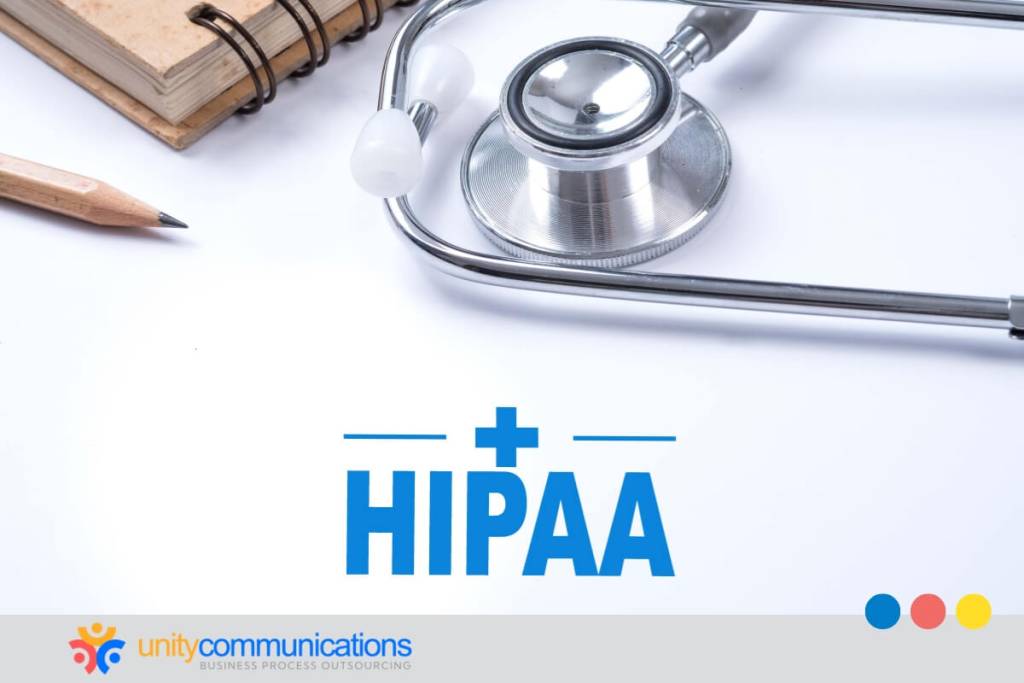IN THIS ARTICLE
Table of Contents
The Health Insurance Portability and Accountability Act of 1996 (HIPAA) establishes critical standards for managing, transmitting, and storing protected health information (PHI). Compliance is essential for securing data and maintaining trust between healthcare providers and patients.
A virtual medical assistant (VMA) plays a critical role in adhering to regulations on appointment scheduling, patient communication, and data management. This article explores strategies healthcare practices can use to ensure virtual medical assistants maintain high service quality and HIPAA compliance. Keep reading to learn valuable insights!
Understanding virtual medical assistants and HIPAA compliance

HIPAA standards guide the healthcare industry in protecting patients and fostering trust. Virtual medical assistants, crucial in patient data handling, must guarantee total HIPAA compliance to achieve these goals.
Basics of HIPAA regulations
HIPAA establishes national standards involving the confidentiality, integrity, and availability of electronic PHI (ePHI). Compliance with HIPAA regulations prevents data breaches and unauthorized access to patient records, which can lead to significant legal, financial, and reputational consequences.
Here are some of the basic principles and critical clauses of HIPAA:
| Privacy rule |
|---|
|
| Security rule |
|
| Breach notification rule |
|
| Enforcement rule |
|
| Omnibus rule |
|
Requirements for VMAs
Virtual medical assistants help improve operational efficiency and maintain high standards of patient care through administrative support. However, they must meet the following HIPAA requirements to protect sensitive patient information:
- Maintain strict confidentiality of patient information.
- Use secure communication channels for all interactions.
- Undergo regular HIPAA training and certification.
- Implement strong access controls and authentication measures.
- Regularly update and review security policies and procedures.
Choosing the right virtual assistant is essential, as a capable professional can meet these requirements. Engaging VMAs through business process outsourcing (BPO) also means they have received the necessary training in HIPAA standards.
But what is BPO? It is the practice of contracting third-party service providers to manage specific functions.
How outsourcing works is the BPO company deploys skilled and experienced VMAs to support the healthcare practice. In particular, they focus on patient interactions, appointment scheduling, and medical billing.
BPO companies also train virtual medical assistants in HIPAA and similar regulations to help healthcare providers comply with them.
Implementing HIPAA-compliant practices with VMAs

Virtual medical assistants typically handle large volumes of patient data. Below are practical strategies to maintain HIPAA compliance when outsourcing administrative tasks in healthcare:
Secure communication channels
Secure communication channels are vital for virtual medical assistants to comply with HIPAA. Various technologies and methods maintain the confidentiality and integrity of patient communications, such as:
- Virtual private networks (VPNs). These help provide secure remote access to healthcare systems and data.
- Secure messaging apps. VMAs can use these encrypted platforms for HIPAA-compliant communication.
- Multi-factor authentication (MFA). Adding security layers to verify user identities can secure communication channels between VMAs, providers, and patients.
- Secure email services. VMAs can use encrypted email solutions to transmit sensitive patient data.
- Audit logs. Detailed communication records enable tracking and promote accountability of VMAs and healthcare practices.
Suppose a medical practice onboards a virtual assistant for its Phoenix healthcare organization. The BPO company must provide remote professional access to secure communication tools and channels to maintain the same level of privacy and compliance.
Data encryption and access controls
Encryption and access controls are fundamental in data security. Encryption converts sensitive patient information into a code only authorized parties can decrypt. The data then remains unreadable if an unauthorized individual intercepts it during transmission.
Access controls involve setting up strict permissions and authentication measures to limit who can view or handle patient data. By enforcing role-based access and regularly updating access permissions, only VMAs and personnel with the appropriate clearance can see and modify sensitive information.
Healthcare BPO service providers might also offer robust security strategies alongside virtual assistance to protect patient data against unauthorized access and breaches, further maintaining compliance with HIPAA.
Training and managing virtual medical assistants for HIPAA compliance

Adequate training and management of VMAs are essential for ensuring compliance with HIPAA regulations. When leveraging BPO in telemedicine, healthcare practices must collaborate with service providers to achieve excellent outcomes.
Regular training on HIPAA guidelines
Ongoing training keeps VMAs updated with changes in HIPAA regulations. Here are ways to do it:
- Organize periodic HIPAA workshops to review and reinforce compliance standards.
- Provide updates on regulatory changes and amendments affecting patient data protection.
- Use scenario-based training or practical exercises to enhance decision-making skills.
- Require completion of HIPAA compliance certification programs or formal HIPAA training programs.
HIPAA audit and monitoring
Healthcare providers must implement regular audits and monitoring to help VMAs comply with HIPAA standards. A comprehensive review that includes periodic audits of access logs and communication records helps identify potential breaches or noncompliance issues in the healthcare process in BPO.
Meanwhile, regularly monitoring security practices, such as reviewing how VMAs handle and safeguard patient data, determines whether they adhere to established protocols. Engaging in routine compliance assessments and corrective actions helps maintain adherence to HIPAA regulations and enhances data security.
The bottom line
Virtual medical assistants help healthcare providers enhance HIPAA compliance by safeguarding sensitive patient information in outsourced administrative tasks. Properly integrating VMAs with communication and data security strategies further advances adherence to HIPAA guidelines.
Meanwhile, continuous training keeps VMAs updated on privacy regulations and best practices. By maintaining robust security measures and regularly reviewing compliance, healthcare providers can effectively protect patient information and uphold the highest data security standards in VMA services.
Let’s connect to learn more about healthcare outsourcing!





